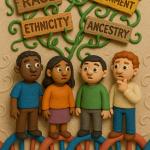Join Cameron English and Dr. Chuck Dinerstein on Episode 135 of the Science Dispatch podcast as they discuss:
genetics
Join Cameron English and Dr. Chuck Dinerstein on Episode 123 of the Science Dispatch podcast as they discuss:
“The two concepts, the social and biological understandings of diversity, have been doing this sort of dance around each other, and sometimes they’re in productive juxtaposition.
Consider this a sort of Public Service Announcement about the nuances of prenatal testing (and, in an odd way, about the selection of individual pronouns).
Join Cameron English and Dr. Chuck Dinerstein on Episode 73 of the Science Dispatch podcast as they explore the link between pesticides, Parkinson's and genetics:
“There is absolutely no doubt that along with exercise and favourable genetics, diet is a key preventative when it comes to disease. But curing disease by eating specific foods is another matter.
The research used our old friend, the UK Biobank, a repository of genetic information on a large number of Brits, as well as a similar genetic registry in Finland, the FinnGen.
Join ACSH directors of bio-sciences and medicine Cameron English and Dr. Chuck Dinerstein as they break down these stories on episode 16 of the Science Dispatch podcast:
Join ACSH directors of bio-sciences and medicine, Cameron English and Dr. Chuck Dinerstein, as they break down these stories:
Join ACSH director of bio-sciences Cameron English and Susan Goldhaber as they break down this story:












